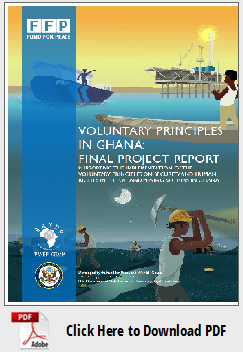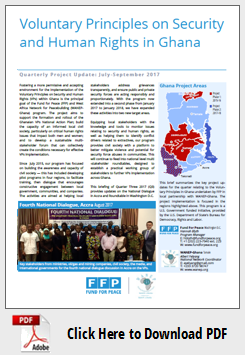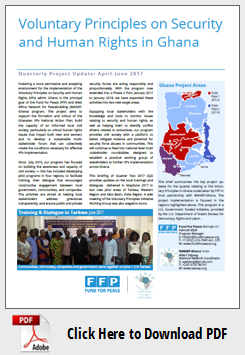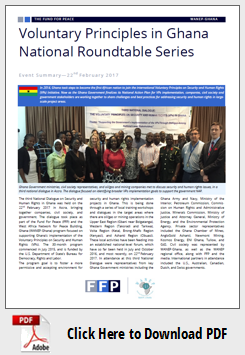 In 2015 when we began this program, the Ghana Government had not long before become the first African nation to sign onto the VPI. To get to this stage, there had already been a swell of momentum by existing VPI member companies and the Ghana Chamber of Mines (CoM) to expand VPSHR usage within the extractives sector. Beyond that core group of company and government stakeholders however, awareness about the VPSHR and its multi-stakeholder approach to mitigating security and human rights risks was limited. Civil society lacked the resources and knowledge about the VPSHR to constructively engage in a coordinated way, companies outside the VPI members and CoM champions remained largely unaware or skeptical of their usefulness, and many Ghana Government ministries were unaware that the Government had signed onto the initiative at all.
In 2015 when we began this program, the Ghana Government had not long before become the first African nation to sign onto the VPI. To get to this stage, there had already been a swell of momentum by existing VPI member companies and the Ghana Chamber of Mines (CoM) to expand VPSHR usage within the extractives sector. Beyond that core group of company and government stakeholders however, awareness about the VPSHR and its multi-stakeholder approach to mitigating security and human rights risks was limited. Civil society lacked the resources and knowledge about the VPSHR to constructively engage in a coordinated way, companies outside the VPI members and CoM champions remained largely unaware or skeptical of their usefulness, and many Ghana Government ministries were unaware that the Government had signed onto the initiative at all.
Fast-forward to 2018, as we close out this program, and the Ghana Government is now taking the lead on a VPs National Action Plan (NAP) that has had extensive consultations from companies, civil society and other government stakeholders. We see a sustainable national Ghana VPI Working Group that is supported by a funding coalition, meeting quarterly to support the NAP implementation and share challenges, lessons learned and successes on security and human rights issues from around the country. We see a cohesive group of Ghana Government champions from multiple ministries, who are all committed to working together within their positions to further specific policy areas on the VPSHR. We see a group of empowered civil society organizations who now have a place at the table and can represent community concerns in a trusted dialogue space, equipped with a deeper knowledge of the VPSHR. We see local stakeholders in five regions of the country working through established local dialogue platforms to engage on security and human rights concerns, using dialogue to resolve grievances peacefully and reporting incidents of conflict risk. We see international governments more engaged in VPSHR implementation, working together through their Embassies to support government and civil society activities and advocating for company engagement on the VPSHR. And finally, we see companies across regions and sectors sharing information, coordinating on common issues and proactively engaging with government, civil society and communities to address security and human rights risks.



